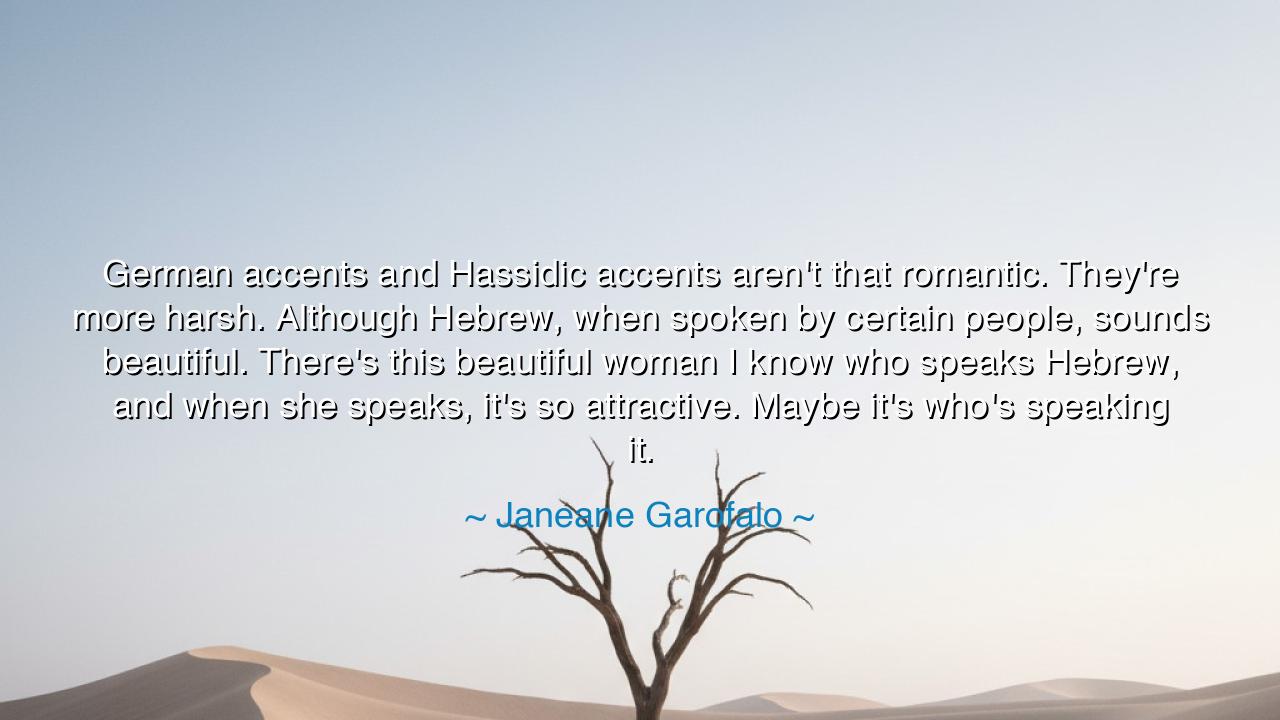
German accents and Hassidic accents aren't that romantic. They're
German accents and Hassidic accents aren't that romantic. They're more harsh. Although Hebrew, when spoken by certain people, sounds beautiful. There's this beautiful woman I know who speaks Hebrew, and when she speaks, it's so attractive. Maybe it's who's speaking it.






"German accents and Hassidic accents aren't that romantic. They're more harsh. Although Hebrew, when spoken by certain people, sounds beautiful. There's this beautiful woman I know who speaks Hebrew, and when she speaks, it's so attractive. Maybe it's who's speaking it." These words spoken by Janeane Garofalo reveal a deep and resonant truth about language—how it is not just a tool of communication, but a vessel of emotion, culture, and personal connection. Accents, the distinctive patterns of speech that mark the people from whom they originate, hold within them a world of meaning. The sound of a language, its rhythm, and its tone can evoke a range of responses in the heart—some warm, some cold, some deeply romantic. But as Garofalo reflects, the same words spoken by different people can carry vastly different emotional weight, for it is not just the language itself, but the speaker who breathes life into it.
In the ancient world, language was a sacred art. Homer, the blind poet of Greece, wove his epic tales through the beauty of language, using the rhythms and cadences of his words to create timeless stories that could captivate the hearts of men for generations. The Greeks understood that words were more than sounds; they were the expression of truth, emotion, and identity. In the same way, Garofalo reflects on how language carries the soul of the speaker. A Hebrew phrase spoken by a beautiful woman can seem to transform the words into something of beauty because it is not just the language itself, but the personality and spirit of the speaker that imbue the words with charm.
The truth that Garofalo touches on is that language is often inseparable from the one who speaks it. This can be seen in the stories of ancient warriors, poets, and philosophers. Julius Caesar, for instance, wielded the Latin language with such power that his words could move armies and sway crowds. His accent, his tone, his way of speaking, was a reflection of his authority—a force that made even the most ordinary phrase feel imbued with greatness. In contrast, the same words spoken by a less charismatic figure might have failed to leave the same lasting impression. It is not just the words themselves, but the spirit of the speaker that transforms them into something memorable.
Consider also the example of Cleopatra, the queen of Egypt, who was known not only for her beauty but also for her command of language. Cleopatra spoke several languages, including Egyptian, Greek, and Latin, each with its own distinctive rhythm and sound. But when she spoke, it was not just the language that captivated her listeners—it was the grace, the intelligence, and the charisma with which she wielded it. Whether she was negotiating with Julius Caesar or Mark Antony, her words were not just sounds; they were weapons of influence, charisma, and seduction. She understood that language could be a tool of power, one that connected her not only to her subjects but also to the great men of history.
In Garofalo's words, we hear a reflection of the timeless truth that it is not only the words we speak but how we speak them and who we are when we speak them that carries meaning. Accents—those markers of cultural identity—are sometimes viewed with prejudice, as they can be associated with particular regions, classes, or historical events. German accents, for instance, often evoke a sense of history, not always romantic, but of strength, order, and sometimes even darkness. The Hassidic accent, marked by its distinctive cadence and rhythm, carries with it the weight of a deeply rooted spiritual tradition, but may also invoke feelings of something foreign, distant, or harsh. Yet, even within these accents, there can be beauty, depending on the individual speaking, their intentions, and their heart.
The lesson, then, is clear: the beauty of language is not fixed in the words themselves, but in the soul of the speaker. Hebrew, for example, is a language that can sound beautiful when spoken with love, grace, and authenticity. This is because the essence of language is tied to the energy with which it is spoken. A beautiful woman speaking Hebrew, imbued with warmth and affection, can make the words resonate far more deeply than a harsh or cold tone ever could. Language is, after all, an expression of the self. It carries within it the emotions, the intentions, and the vulnerabilities of the one who speaks.
Thus, in our own lives, we must remember that our words hold power—not only in their meaning but in the way we speak them and the energy we bring into the conversation. Kindness, compassion, and intention are what make language beautiful. Whether we are speaking Hebrew, German, or any other language, it is our ability to speak from the heart, to connect with others through our words, that creates true beauty in communication. So, speak with love, speak with honesty, and let your words reflect the best of who you are, for in this way, you will discover the power of language to truly touch the hearts of those around you.






AAdministratorAdministrator
Welcome, honored guests. Please leave a comment, we will respond soon